-

新人教版高中英语必修3Unit 2 Morals and Virtues-Reading for Writing教学设计
1. 这个寓言是一个关于一位国王古寓言。 The fable is an old fable about a king.2.作者用这个故事让读者对于社区的问题负有个人责任的必要印象深刻。The author used the story to impress upon readers with the need to take personal responsibility for problems in the community.3. 这个故事十分成功的实现了它的目的。The story was quite successful in achieving its purpose.Step 7 WritingPlease write a review of the story according the outline above.The fable is an old fable about a king who thought his people are lazy, so he put a large stone in the middle of the road and hides and waited to see if anyone will try to move it.The author used this story to impress upon readers with the need to take personal responsibility for problems in the community. The story was quite successful in achieving its purpose, and I liked it because it had a clear moral.However, while the moral of the story is clear, the actions of the king seemed pointless to me, because none of the characters in the story learnt anything. For this reason, I think there are better stories that can be used to impress upon people with the need for personal responsibility.Step 8 Pair workExchange drafts with a partner. Use this checklist to help your partner revise his/her draft.1. Does the writer give a short description of the story ?2. Does the description include the most important details of the story ?3. Does the writer give his or her opinion about the character or their actions ?4. Is the review well-organised ? 5. Does the writer use the -ing form as the adverbial correctly in the writing ?6. Are there any grammar, spelling, or punctuation errors ?Step 9 HomeworkPut up your revised draft in the classroom or read it to your class.

新人教版高中英语必修3Unit 3 Diverse Cultures-Discovering Useful Structure教学设计
Step 4 PracticeRead the conversation. Find out which words have been left out.Justin: Linlin, I’m going to Guizhou Province next month. I’m super excited! Any recommendations for places to visit?Linlin: Wow, cool! Guizhou is a province with a lot of cultural diversity. Places to visit...well, definitely the Huangguoshu Waterfall first.Justin: What’s special about the waterfall?Linlin: Well, have you ever heard of the Chinese novel Journey to the West ?Justin: Yes, I have. Why ?Linlin: In the back of the waterfall, you will find a cave, which is the home of the Monkey King.Justin: Really? Cool! I’ll definitely check it out.Linlin:And I strongly recommend the ethnic minority villages. You’ll find Chinese culture is much more diverse than you thought.Justin:Sounds great, thanks.Answers:Justin: Linlin, I’m going to Guizhou Province next month. I’m super excited! Do you have any recommendations for places to visit?Linlin: Wow, that’s cool! Guizhou is a province with a lot of cultural diversity. What are some places to visit in Guizhou ? Well, definitely the Huangguoshu Waterfall is the first place to visit in Guizhou Province.Justin: What’s special about the waterfall?Linlin: Well, have you ever heard of the Chinese novel Journey to the West ?Justin: Yes, I have heard of the Chinese novel Journey to the West . Why do you ask if I have heard of the Chinese novel Journey to the West?Linlin: In the back of the waterfall, you will find a cave, which is the home of the Monkey King from Journey to the West.Justin: That’s really true? It’s Cool! I’ll definitely check it out.Linlin:And I strongly recommend the ethnic minority villages on your trip to Guizhou Province. You’ll find Chinese culture is much more diverse than you thought it was.Justin:This all sounds great, thanks.

新人教版高中英语必修3Unit 3 Diverse Cultures-Reading for Writing教学设计
The topic of this part is “Describe a place with distinctive cultural identity”.This section focuses on Chinese culture by introducing Chinatown, whose purpose is to show the relationship between the Chinese culture and American culture. The Chinese culture in Chinatown is an important part of American culture. Chinatown is an important window of spreading Chinese culture and the spirit homeland of oversea Chinese, where foreigners can experience Chinese culture by themselves.Concretely, the title is “Welcome to Chinatown!”, from which we can know that the article aims at introducing Chinatown. The author used the “Introduction--Body Paragraph--Conclusion” to describe the people, language, architecture, business, famous food and drinks and people’s activities, which can be a centre for Chinese culture and shows its unique charm.1. Read quickly to get main idea; read carefully to get the detailed information.2. Learn the characteristics of writing and language.3. Learn to introduce your own town according to the text.4. Learn to correct others’ writing.1. Learn the characteristics of writing and language.2. Learn to introduce your own town according to the text.Step 1 Lead in ---Small talkIn the reading part, we mentioned the Chinatown of San Francisco. How much do you know about Chinatown of San Francisco ?Chinatown is a main living place for Chinese immigrants, where you can see many Chinese-style buildings, costumes, operas, restaurants, music and even hear Chinese.Step 2 Before reading ---Predict the contentWhat is the writer’s purpose of writing this text ? How do you know ?From the title(Welcome to Chinatown) and some key words from the text(tourist, visit, visitors, experience), we can know the purpose of the text is to introduce Chinatown and show the relationship between Chinese culture and American culture.

新人教版高中英语必修3Unit 4 Space Exploration-Listening&Speaking&Talking教学设计一
Listening and Speaking introduces the topic of “talking about how to become an astronaut”. This period is aimed to inform students some details about the requirements of being an astronaut. Students can be motivated and inspired by the astronauts. Teachers ought to encourage students to learn from them and let them aim high and dream big.Listening and Talking introduces the theme of "talk about life in space". This part also informs students more details about life in space and can inspire students to be curious about this job. 1. Guide students to listen for numbers concerning dates, years and ages etc2. Cultivate students' ability to talk about how to become an astronaut and life in space ; 3. Instruct students to use functional sentences of the dialogue such as “ first of all, I am not sure, so what might be .. I guess.. I wonder…I am curious…)appropriately.1. Guide students to understand the content of listening texts in terms of the whole and key details; 2. Cultivate students' ability to guess the meaning of words in listening; discuss with their peers how to become a qualified astronaut and describe the life in space.Part 1: Listening and SpeakingStep 1: Lead inPredictionThe teacher can ask students to predict what the listening text is about by looking at the pictures.About how to become an astronaut./the requirements of an astronautStep 2: Then, play the radio which is about an interview a. And after finishing listening for the first time, the students need to solve the following tasks.

新人教版高中英语必修3Unit 4 Space Exploration-Listening&Speaking&Talking教学设计二
The themes of this part are “Talk about how to become an astronaut” and “Talk about life in space”. As Neil Armstrong said “Mystery creates wonder and wonder is the basis of man’s desire to understand. Space is difficult for human to reach, therefore, humans are full of wonders about it. However, if wanting to achieve the dream of reaching the Moon, some of our human should work hard to be an astronaut at first. Part A(Talk about how to become an astronaut) is a radio interview in a radio studio, where the host asked the Chinese astronauts about his story how to become an astronaut. Yang Liwei told his dreamed to be an astronaut since childhood. Then he worked hard to get into college at 22. The next 10 years, he gradually became an experienced pilot. At the same time, to be an astronaut, he had to study hard English, science and astronomy and trained hard to keep in good physical and mental health and to practise using space equipment. Part B (Talk about life in space) is also an interview with the astronaut Brown, who is back on the earth. The host Max asked about his space life, such as his emotion about going back the earth, the eating, shower, brushing, hobbies and his work. Part A and Part B are interviews. So expressing curiosity about the guests’ past life is a communicative skill, which students should be guided to learn.1. Students can get detailed information about how Yang Liwei became an astronaut and Max’s space life.2. Students learn to proper listening strategy to get detailed information---listening for numbers and taking notes.3. Students can learn related sentences or phrases to express their curiosity like “ I wish to know...” “I’d love to know...”4. Students can learn more about the space and astronauts, even be interested in working hard to be an astronaut

新人教版高中英语必修3Unit 4 Space Exploration-Reading for Writing教学设计二
⑦在我看来, 探索太空是值得的。As far as I am concerned, it is worthwhile to explore the space.Step 10 Writing---draftRecently, students in our class have had heated a discussion on whether space is worth exploring. Students hold different ideas about it.30% of us think space exploration is not worthwhile. They think space is too far away from us and our daily life and is a waste of money. And the money spent on space exploration can be used to solve the earth’s problems such as starvation and pollution.On the other hand,70% think space is worth exploring because we have benefited a lot from it,such as using satellites for communication and weather forecast. What’s more,with further space research,we may solve the population problem by moving to other planets one day. Also,space research will enable us to find new sources to solve the problem of energy shortages on the earth.As far as I am concerned, it is worthwhile to explore the space. Not only can it promote the development of society but also enrich our life. Step 11 Pair workExchange drafts with a partner. Use this checklist to help your partner revise his/her draft.1.Does the writer explain why he/she changed/wanted to change?2.Does the writer tell how the changes have improved or will improve his/her life?3.Is the text well-organised?4.Does the writer use words and expressions to show similarities and differences?5.Are there any grammar or spelling errors?6.Does the writer use correct punctuation?

新人教版高中英语必修3Unit 5 The Value of Money- Discovering Useful Structure教学设计
Step 3 Meaning1. 过去将来时表示从过去某一时间来看将要发生的动作或存在的状态, 常用在宾语从句中。一般由“would/should +动词原形”构成。She hoped that they would meet again someday. 她希望将来有一天他们能再见面。2. was/were going to+动词原形: 表示过去将要发生或很有可能发生的动作, 常用于口语中, 表示预言、意图或者打算等。He was going to start work the following week. 他打算下星期开始工作。3. was/were about to do: 常用来表示即将发生的动作, “刚要/正要做……”。注意该结构不与任何时间状语连用。I felt that something terrible was about to happen. 我感到某种可怕的事情即将发生。4.was/were to do: 表示“曾计划做某事”, 如果表示“本来计划做某事, 动作没实现”, 则需用 “was/were to have done”。She said she was to have told me about the accident. 她说她本来想告诉我关于事故的事。5.Start, go, come, leave, see, meet等动词的过去进行时: 表示就过去某一时刻而言即将发生的动作。She was coming later. 她随后就来。I had just put on my overcoat and was leaving to visit a friend of mine. 我刚穿上外套要去看我的一个朋友。

新人教版高中英语必修3Unit 5 The Value of Money-Listening &Speaking教学设计
Step 4: Listen again and decide if the following statements are true (T) or false (F).1 It was the first time Chen Liyan's story was reported. T口 F口2 Chen found 10,000 yuan in a small plastic bag in Taiyuan railway station口 F口3 Wang Zheng apologized to Chen because he couldn't offer her more money. T口 F口4 Chen took out a large loan to cure her daughter, T口 F口5 Wang set up a fundraising website for Chen's daughter after Chen told him about her situation. T口 F口Step 5:After listening, discuss the questions.1 What kind of person do you think Chen Liyan is?Chen Liyan is generous and honest because she returned a large sum of money to the owner.2 Did Chen return the money because she didn't need it?No. She returned the money because it was the right thing to do. Evidence for this is that she refused to accept the reward money because she felt that it had not been earned. 3 Is it common for people to do what Chen did?It depends on the culture. In some countries it is quite common to return money that has been found. In other countries, people believe "Finders are keepers!" 4 How did Wang Zheng feel about the return of his money?He must have been very happy and relieved to have gotten his money back. We know this because he thanked Chen repeatedly and even offered her a reward.5 Why did Ma Dongbao tell Wang about Chen's family?He must have had great sympathy for Chen and her daughter and wanted to help them.'We know this because he arranged help for them. 6 How did the news reporter feel about Chen's actions?The news reporter felt that it showed that money wasn't the most important thing in life. We know this because the reporter told us that this is what Chen believes. and then said, “that's a great attitude to take."

新人教版高中英语必修3Unit 5 The Value of Money-Reading and Thinking教学设计一
Everybody wants to get wealth.In today’s material world,making money or becoming wealthy symbolizes a person’s success and capability. Many people just make every effort, pay any price to attain greater wealth. With money,they can buy nice, large apartments in nice neighborhood. With money they can own luxurious cars. Wealth seems to bring all happiness in life.But is wealth the only road to happiness? Not really. There are many things in the world, which are beyond the means of money, such as friendship, love, health and knowledge. People are so preoccupied with struggling for money that they have no time or would not take the time to form or maintain friendship. What happiness can they feel living as lonely miserable creatures without love or friends in the world even if they accumulate tremendous wealth?In my opinion, people can’t do anything without money, but money is not everything. What money will bring you depends on your personal belief and goal in life. If you are kind enough to help others, especially the poor, money is a good thing to you. With it, you can do much more for the benefit of people and your country, and it will add to your own happiness. If you want money just for your own needs, you’ll never be satisfied or happy. In a word,you should have money spent for more people. Only then can money be the source of your happiness.Step 8 Homework4 students in a group, one acts Roderick, one Oliver, one servant and the fourth one acts Henry Adams, then listen to the tape, pay more attention to the difference between American English and British English in pronunciation, stress, tone.

新人教版高中英语选修2Unit 4 Journey Across a Vast Land教学设计
当孩子们由父母陪同时,他们才被允许进入这个运动场。3.过去分词(短语)作状语时的几种特殊情况(1)过去分词(短语)在句中作时间、条件、原因、让步状语时,相当于对应的时间、条件、原因及让步状语从句。Seen from the top of the mountain (=When it is seen from the top of the mountain), the whole town looks more beautiful.从山顶上看,整个城市看起来更美了。Given ten more minutes (=If we are given ten more minutes), we will finish the work perfectly.如果多给十分钟,我们会完美地完成这项工作。Greatly touched by his words (=Because she was greatly touched by his words), she was full of tears.由于被他的话深深地感动,她满眼泪花。Warned of the storm (=Though they were warned of the storm), the farmers were still working on the farm.尽管被警告了风暴的到来,但农民们仍在农场干活。(2)过去分词(短语)在句中作伴随、方式等状语时,可改为句子的并列谓语或改为并列分句。The teacher came into the room, followed by two students (=and was followed by two students).后面跟着两个学生,老师走进了房间。He spent the whole afternoon, accompanied by his mom(=and was accompanied by his mom).他由母亲陪着度过了一整个下午。

新人教版高中英语选修2Unit 1 Science and Scientists-Using langauge教学设计
This happens because the dish soap molecules have a strong negative charge, and the milk molecules have a strong positive charge. Like magnets, these molecules are attracted to each other, and so they appear to move around on the plate, taking the food coloring with them, making it look like the colors are quickly moving to escape from the soap.Listening text:? Judy: Oh, I'm so sorry that you were ill and couldn't come with us on our field trip. How are you feeling now? Better?? Bill: Much better, thanks. But how was it?? Judy: Wonderful! I especially liked an area of the museum called Light Games.it was really cool. They had a hall of mirrors where I could see myself reflected thousands of times!? Bill: A hall of mirrors can be a lot of fun. What else did they have?? Judy: Well, they had an experiment where we looked at a blue screen for a while, and then suddenly we could see tiny bright lights moving around on it. You'll never guess what those bright lights were!? Bill: Come on, tell me!? Judy: They were our own blood cells. For some reason, our eyes play tricks on us when we look at a blue screen, and we can see our own blood cells moving around like little lights! But there was another thing I liked better. I stood in front of a white light, and it cast different shadows of me in every color of the rainbow!? Bill: Oh, I wish I had been there. Tell me more!? Judy: Well, they had another area for sound. They had a giant piano keyboard that you could use your feet to play. But then, instead of playing the sounds of a piano, it played the voices of classical singers! Then they had a giant dish, and when you spoke into it, it reflected the sound back and made it louder. You could use it to speak in a whisper to someone 17 meters away.? Bill: It all sounds so cool. I wish I could have gone with you? Judy: I know, but we can go together this weekend. I'd love to go there again!? Bill: That sounds like a great idea!

新人教版高中英语选修2Unit 3 Food and Culture-Discovering useful structures教学设计
The newspaper reported more than 100 people had been killed in the thunderstorm.报纸报道说有一百多人在暴风雨中丧生。(2)before、when、by the time、until、after、once等引导的时间状语从句的谓语是一般过去时,以及by、before后面接过去的时间时,主句动作发生在从句的动作或过去的时间之前且表示被动时,要用过去完成时的被动语态。By the time my brother was 10, he had been sent to Italy.我弟弟10岁前就已经被送到意大利了。Tons of rice had been produced by the end of last month. 到上月底已生产了好几吨大米。(3) It was the first/second/last ... time that ...句中that引导的定语从句中,主语与谓语构成被动关系时,要用过去完成时的被动语态。It was the first time that I had seen the night fact to face in one and a half years. 这是我一年半以来第一次亲眼目睹夜晚的景色。(4)在虚拟语气中,条件句表示与过去事实相反,且主语与谓语构成被动关系时,要用过去完成时的被动语态。If I had been instructed by him earlier, I would have finished the task.如果我早一点得到他的指示,我早就完成这项任务了。If I had hurried, I wouldn't have missed the train.如果我快点的话,我就不会误了火车。If you had been at the party, you would have met him. 如果你去了晚会,你就会见到他的。

新人教版高中英语选修2Unit 5 First Aid-Discovering useful structures教学设计
You have no excuse for not going.你没有理由不去。He was punished for not having finished his homework.他因未完成作业而受到惩罚。2.动词ing形式复合结构由物主代词或人称代词宾格、名词所有格或普通格加动词ing,即“sb./sb.'s+doing”构成。动词ing形式的复合结构实际上是给动词ing形式加了一个逻辑主语。动词ing形式的复合结构有四种形式:①形容词性物主代词+动词ing②名词所有格+动词ing③代词宾格+动词ing④名词+动词ingHer coming to help encouraged all of us.她来帮忙鼓舞了我们所有人。The baby was made awake by the door suddenly shutting.这个婴儿被突然的关门声吵醒了。Can you imagine him/Jack cooking at home?你能想象他/杰克在家做饭的样子吗?无生命名词无论是作主语还是作宾语都不能用第②种形式。Tom's winning first prize last year impressed me a lot.汤姆去年得了一等奖使我印象深刻。Do you mind my/me/Jack's/Jack leaving now?你介意我/杰克现在离开吗?Excuse me for my not coming on time.很抱歉我没能按时来。His father's being ill made him worried.他父亲病了,他很担心。We are looking forward to the singer's/the singer to give us a concert.我们盼望着这位歌手来给我们举办一场演唱会。
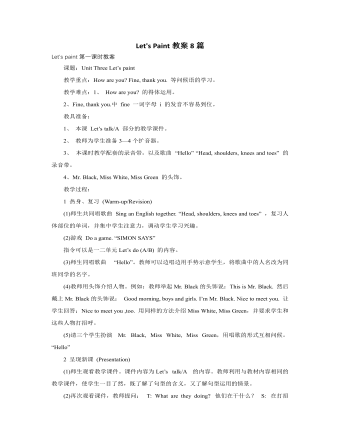
人教版新课标PEP小学英语三年级上册Let's Paint教案8篇
教学设计理念:英语课程标准明确指出,学生的发展是英语课程的出发点和归宿。小学英语课的主要目标是培养学生用英语做事情的能力,同时重视学科内容的有效融合。新课程提倡任务型教学,让学生在教师的指导下通过感知、体验、实践、参与和合作等方式完成教学目标。本着这一理念,我在设计本课时从激发和保持学生的学习兴趣入手,精心创设生活化语言情景,开展丰富多彩的活动,让学生在我的指导下进行语言交流,感受用英语交流的乐趣和成功感,从而培养学生用英语进行交流的能力。教学目标:1. 情感目标:关注学生的内在需要,在活动中培养学生的协作精神和竞争意识,培养学生学习英语的积极情感态度。2. 知识目标:能运用所学语言进行交流。3. 能力目标:通过本课的学习,学生能在实际生活中用英语进行问候;培养学生在课堂上进行自主评价的能力;培养学生根据情景猜测语义和在尝试中自我修正的学习策略。
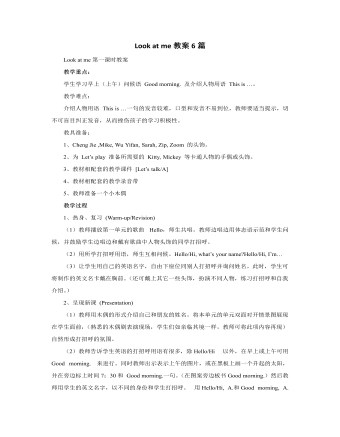
人教版新课标PEP小学英语三年级上册Look at me教案6篇
1.小组学习法全班分成各个部位,以半弧形状摆设,不仅拉近了师生、同学间的距离,便于口语交际和合作学习,而且让学生在独立与合作的交织中变得大胆、自信。2)Learning by singing, chanting, playing, touching.通过这些活动激发学生学习英语的兴趣,帮助他们建立学习的成就感和自信心。四.教学步骤英语课程的学习即是学生通过英语学习和实践活动逐步掌握语言知识,技能,提高实际运用能力的过程,又是他们陶冶情操,拓宽视野形成有效学习策略的过程。整个教学我设计了复习——新知展示——练习——小结及作业布置四个步骤。一.Warm-up1.Geetings2.SingasongT:Do you like to sing a song?Ss: Yes.T: Now, Let’s sing as ong,OK?Ss:OK. 【教师和学生一起边拍手边唱这首歌,不仅复习前面的打招呼语,而且把学生拉回到英语课堂,活跃了课堂的氛围,增加学生的学习兴趣】3.guessinggameT: Good. Look at me, What’s in my hand ?【教师拿出一个书包,书包内装入了各种学过的文具和一个玩具人头,让学生感到新奇,从而增强兴趣】
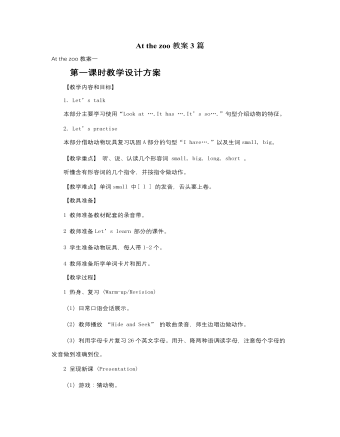
人教版新课标PEP小学英语三年级下册At the zoo教案3篇
(二) 呈现新课 (Presentation)1、教师出示学过的缩略语PRCUKCANUSA让孩子读一读,然后拿出相应的卡片贴在黑板上请掌握较好的学生带着同学们读一读缩略语2、出示课文中的缩略语,让孩子们自己试着读一读,然后试着说说缩略语的含义3、听录音,跟读。小组说说4、让孩子们介绍自己收集的生活中的缩略语教师给以适当的扩充:CCTVWTOUFO等5、教师分别出示大小写Hh,让孩子想想大小写的字母分别想什么,用语言描述或是用动作表示。6、Let’s chant听录音,边听边打节奏听录音,边听边出示相应的字母听录音,边听边试着说歌谣孩子们带上自己的头饰,在小组中边演边说各小组展示(三)趣味操练(Practice)1、listen and order the cards让孩子说字母,按照听到的顺序排列字母2、listen and guess教师拼一拼缩略语,孩子快速说出词小组游戏(四) 扩展性活动(Add-activities)纸牌游戏两个孩子分别有一套学过的字母卡,按顺序出卡片,看谁能最先组成一个学过的缩略语。【板书设计】
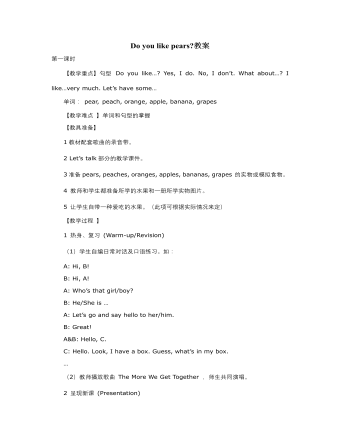
人教版新课标PEP小学英语三年级下册Do you like pears教案
教师扮做客人,让孩子根据问题做出反应并回答。 Can I have an apple? Can I have some grapes? Let’s sing 播放歌曲的录像,先观看一遍, 帮助孩子理解歌曲。 孩子边唱边表演。 小组表演,小组展示。 (四) 扩展性活动(Add-activities) Coloring Draw some grapes, color them red Draw a banana,color it green. …, …【板书设计 】Do you like pears? Do you like pears? 第五课时第六课时【课题】Do you like pears? 第六课时 【教学重点】听、说、认读字母Rr Ss Tt,体会字母在单词中的发音 【教学难点 】字母Ss的发音。Tiger中字母I的发音 【教具准备】 1、本课生词的单词卡片 2、配套的教学课件 3、相配套的教学录音带 4、学生的小英语练习本 5、大字母卡片,每组一套的小字母卡片 【教学过程 】 (一)热身/复习(Warm-up/Revision) 1、Let’s sing 演唱B部分的歌曲,边唱边演。
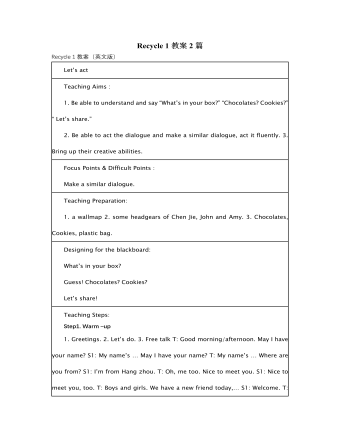
人教版新课标PEP小学英语三年级下册Recycle 1教案2篇
1.猜袋中东西数 将全班分成若干小组,每组抽一人到前面,背对着班级。教师拿一个袋子,并向学生们借一些书本,铅笔,钢笔,橡皮等,放入袋中,然后让各组学生轮流猜袋子里东西的数目,猜对的给该组记10分。 2.学生一起有节奏地说唱Let’s chant部分的歌谣,并请学生分角色表演。 (二)呈现新课 (Presentation) 1.抢读单词 教师将全班分成若干小组,然后逐个出示一些图片,学生们举手抢答,教师让最先举手的学生将图片的单词说出来,说对的给该组记10分,得分最多的组为优胜。 2.看单词卡读出单词并说出中文,复习1-3单元要求四会的单词。 3.教师用实物投影出示1-3单元课文中的某一幅图片,让学生根据图片内容进行对话练习。 4.让学生填写Assessment部分的内容,自己对1-3单元所学内容的掌握情况进行自我评价。 5.教师向学生出示已制作好的window card:This si a window card.并教读window card教师问学生:Do you like it? Can you make it? Do you want to learn how to make a window card?
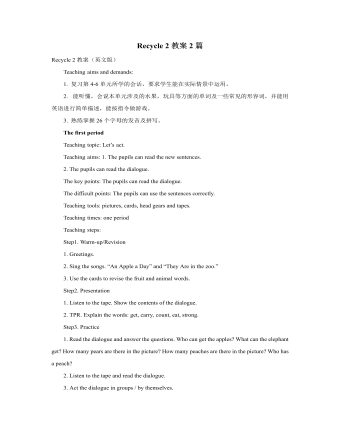
人教版新课标PEP小学英语三年级下册Recycle 2教案2篇
第三课时教学设计方案【教学内容和目标】【教学重点】 制作键盘; 学唱英文歌曲 “A B C Song ”。【教学难点】复习过程中的兴趣培养;【教具准备】1 教材配套的录音带。2 教师和学生分别准备废旧的硬纸盒/纸版、剪刀、胶水。3 教师准备一个自己已制作好的键盘。4 教师准备字母卡片和真正的键盘一个。【教学过程】1 热身、复习 (Warm-up/Revision)(1)师生之间进行英语对话或进行日常口语活动。(2)学生之间自编对话并表演。(3)教师播放B Let’s chant 的录音,让学生边拍手边说歌谣。(4)游戏:Silent Speech教师换一种方法说字母------唇说,说字母的时候不发出声音。学生看教师的口形,猜教师“说”的内容。说的字母为Aa----Zz 。2 呈现新课 (Presentation)(1)教师出示字母卡片,学生认读字母Aa----Zz。(2)学生字母背诵Aa----Zz。(3)教师播放歌曲 “A B C Song ”,告诉学生“试一试”“比一比”,看看谁能通过自己试唱学会歌曲。
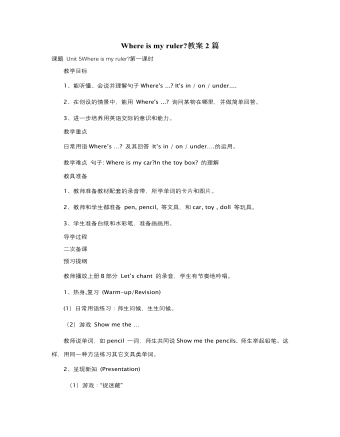
人教版新课标PEP小学英语三年级下册Where is my ruler教案2篇
1.Let’s say学习字母Uu, Vv, Ww,以及以这些字母开头的单词。2.Let’s do本部分通过有韵律的歌谣,来复习巩固A-W的字母。【教学重点】学习字母Uu, Vv, Ww及以其为首字母的单词【教学难点】单词umbrella, violin, wind和字母Uu, Vv, Ww的发音.【教具准备】1 教师准备教材配套的录音带。2 教师准备 umbrella, vest, violin, window, wind 的图片和词卡。3 教师准备字母卡 Aa----Ww 。【教学过程】1 热身、复习 (Warm-up/Revision)(1)Oral practice学生口语会话展示。教师可根据学生情况提示他们增加对内容。(2)游戏:“猜猜看”。教师用简笔画的方法在黑板上画某种交通工具的某个部位,边画边问:What is it? 学生随意想象,猜图说:A panda? A jeep? A pear? … 教师再继续画一两笔,让学生接着猜,并以小组为单位讨论,最后由一名学生代表说出一个答案。教师将图画完,带领学生一起说: Look! It’s a … 猜对的小组赢得一分。(以交通工具、玩具和文具词为主) 还可让学生代替教师进行此项活动。

